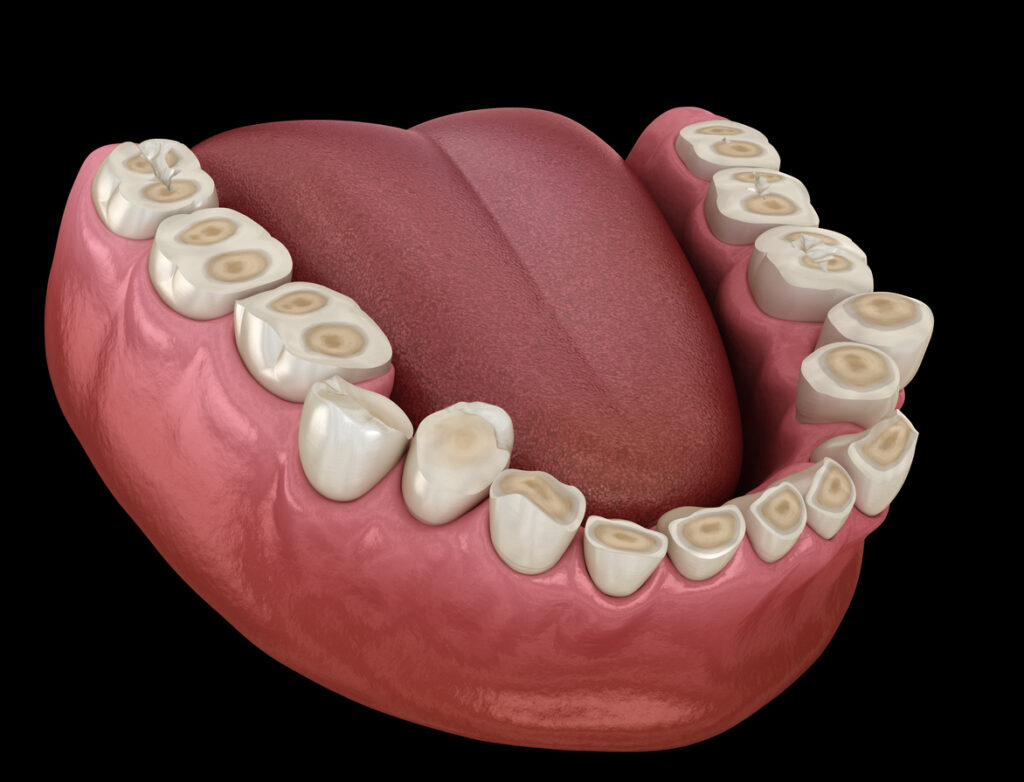Teeth Grinding (Bruxism)
Teeth grinding is a common behavior in babies, toddlers, and young children that typically goes away on its own as kids get older.
Teeth Grinding in Infants, Toddlers, and Children
Bruxism is a medical condition that is more commonly known as teeth grinding. During each stage of life there are similar experiences that contribute to frequent or unconscious teeth grinding. Bruxism is common in infants, toddlers, and young children but usually stops by the teenage years.
Most kids outgrow bruxism but regular dental visits and parental support can help reduce the negative effects of your child’s teeth grinding in the meantime. It is important if your child has lost their baby teeth, that we work together to prevent teeth grinding. If untreated, after baby teeth have fallen out, damage to your child’s permanent teeth is likely to occur. Children can also develop temporomandibular joint disorder (TMJ) from repeatedly clenching their jaw while grinding their teeth.
Teeth Grinding Treatment
Bruxism treatment can include correctly aligning teeth that are misaligned, altering bite issues with crowns, or making a custom mouth guard for your child. We are here to help! We will monitor your child’s oral health, including any effects of teeth grinding, from their first visit up until their teenage years to ensure any possible damage is prevented. We offer custom kids mouth guards to ensure your child’s teeth are protected if they are grinding during the day or at night. If you believe your child is dealing with teeth grinding, call our office to schedule an appointment.

-
What are common teeth grinding (bruxism) symptoms?
- Frequent teeth grinding
- Jaw clenching
- Grinding loud enough to hear
- Damaged or worn teeth
- Earaches
-
Why do babies grind their teeth?
Teeth grinding may start when a child is only 6 months old, or when they get their first tooth. This behavior continues as babies grow into toddlers. Toddlers’ teeth grinding typically occurs while they’re sleeping. Reasons for teeth grinding in babies and toddlers include:
- Curiosity. When teeth come in for a baby or toddler, they are curious about the function, feelings, and sound of their new teeth. Grinding their teeth provides them a way to explore all of the new senses they are experiencing.
- Stress response. Babies and toddlers can’t communicate that they’re stressed or unhappy and one of the ways they deal with this is by grinding their teeth.
- Pain relief. Infants and toddlers experiencing pain from a new tooth or suffering from a toothache, just like adults do, use teeth grinding as a way to relieve their pain.
- Medical condition. The effects of certain medical conditions, such as cerebral palsy or certain types of medications, can cause children to, usually uncontrollably, grind their teeth.
-
How can I get my infant or toddler to stop grinding their teeth?
The sound of grinding teeth is certainly one parents don’t want to hear, at all. There are natural remedies or preventative measures available, depending on your child’s age.
Baby Grinding Teeth Remedies
Babies often grind their teeth to relieve the pain of their new teeth coming in. Providing your child with any of the following remedies should help relieve their pain:
- Soft rubber teethers that are conforming to your child’s mouth
- Cold rubber teething toys that can ease pain from teeth coming in
- Silicone teething necklaces
Toddler Grinding Teeth Remedies
A common reason for toddlers teeth grinding is because it provides them with a way to relieve stress. Toddlers are also more likely to grind their teeth in their sleep. Giving your child a calming bedtime routine, that is relaxing and stress-reducing, can significantly help. Some calming bedtime routines include:
- Reading a book together
- Dimming the lights as bedtime approaches
- Playing a white noise machine
- Implement a screen time curfew—The Sleep Foundation recommends no screen time within the hour before bedtime.
- Use calming scents, such as lavender, in your child’s room
Bruxism treatment usually isn’t required until children have lost their baby teeth. If your child has their first tooth, or are starting to get baby teeth—we hope to see them for their first dental visit!
Questions About Teeth Grinding?
If you have any questions about teeth grinding contact us today, request an appointment for your child, or explore the other pediatric dental services we offer using the links below.

